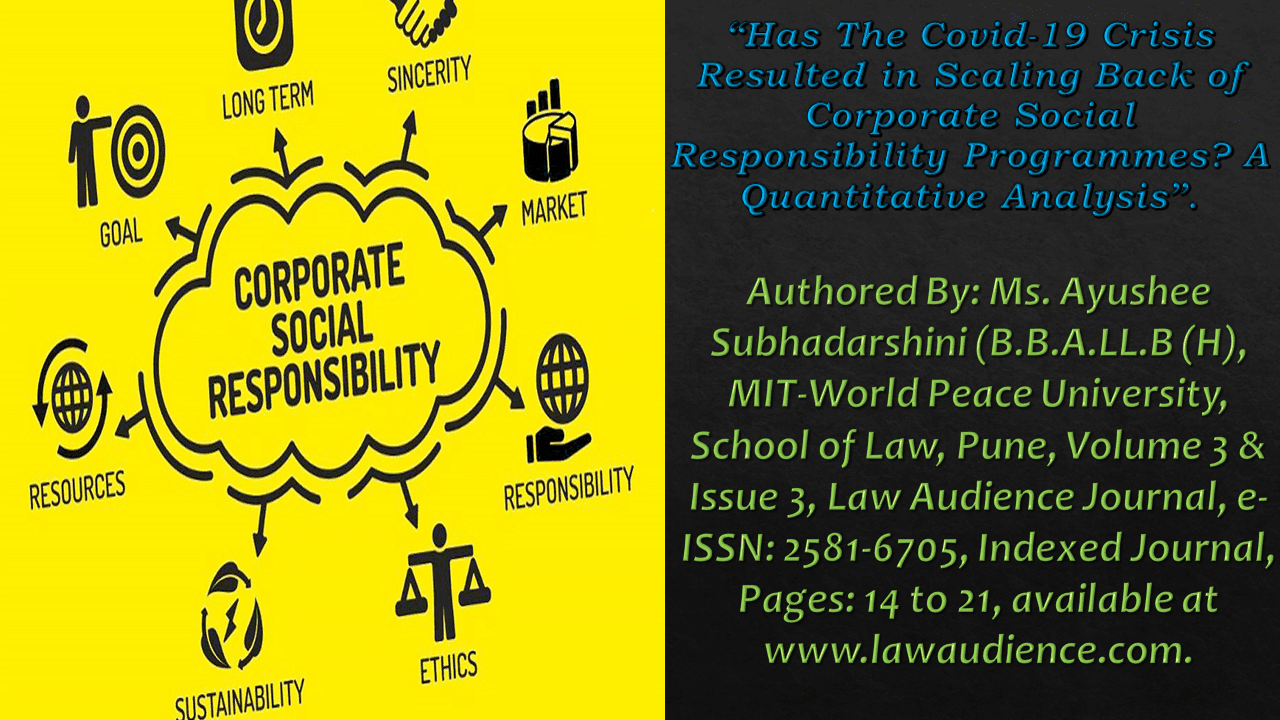Click here to download the full paper (PDF)
Authored By: Ms. Ayushee Subhadarshini (B.B.A.LL.B (H), MIT-World Peace University, School of Law, Pune,
Click here for Copyright Policy.
ABSTRACT:
“Corporate Social Responsibility (hereinafter referred to as CSR), is about how companies and corporations have a responsibility towards the society. This paper mainly focuses on how the covid-19 crisis has resulted in the step down of CSR programmes. The various types of CSR Trends which are followed in India are mentioned in the following paper as we know that CSR is a legal requirement for companies that have met specified conditions. After the declaration of the coronavirus outbreak as a notified disaster how the classification of funds was done and spent on covid-19 is an eligible CSR activity. It also talks about the PM Cares Fund and how it will be used in case of emergency and how it will contribute towards the corporate social responsibility, there are various amendments of CSR norms to include research and development spending on vaccines drugs and medical devices related to covid-19.
To bring attention to an often-overlooked element of corporate India, this report was written by Invest India. It includes learning from our engagements and insights into major trends, as well as a broad overview of the changing environment of CSR in India, particularly during COVID-19. It also discusses the importance of corporate social responsibility (CSR) for technical incubators in the fight against COVID-19. This paper is based on primary research conducted through a survey of businesses and government incubators. Secondary information was gathered through firm annual reports, MCA notifications, and CSR reports in India”.
I. INTRODUCTION:
Although there is no commonly agreed definition of Corporate Social Responsibility (CSR), the heart of the concept is based on the belief that corporations have a responsibility to society and the people who help them succeed. CSR has become a vital and significant component of the corporate landscape in nations like India, where economic integration and social inclusion are imperative factors driving the masses towards progress and prosperity.[1]
II. INDIA’S CSR TRENDS:
India was the first country in the world to make CSR a legal requirement for companies that met specified conditions. Corporate India’s CSR spending has surged dramatically after the implementation of mandated CSR provisions in 2014. According to a survey, firms spent 47% more on CSR projects in 2018 than they did in 2014-15, giving $1 billion (about Rs 7,400 crore). Companies were obliged to venture outside their comfort zone and onto a steep learning curve by legislation that was only five years old. In the last four years, the average reporting rate among qualified businesses has been 64%. In the last four years, companies invested Rs 52,000 crore or 68 per cent of the prescribed CSR contribution.
Listed firms in India invested Rs 10,000 crore on a variety of programmes, including education, skill development, social welfare, healthcare, and environmental protection. Over the previous year, CSR contributions to the Prime Minister’s Relief Fund increased by 139%. (2019-20). Education received the most money (38 per cent), followed by hunger, poverty, and healthcare (25 per cent), environmental sustainability (12 per cent), and rural development (12 per cent) (11 per cent).[2] Technology incubators, sports, the armed forces, and inequality reduction programmes received very little funding.
III. CSR IN TIMES OF COVID-19:
The World Health Organization has classified COVID-19 as a global pandemic (WHO). The contagious sickness wreaked havoc on the world’s socio-economic situation. Distancing oneself from one’s peers was crucial in halting the development of this terrible disease. In March 2020, the Indian government and state governments declared lockdowns around the country to encourage social distancing, which essentially urged the population to keep a social and physical distance. Longer lockdowns exacerbated the economy’s problems. The challenges were exacerbated by a large population and a lack of knowledge (due to a lack of education).[3] Herein lays the significance of CSR, which played a critical role during the pandemic, when people were doing everything, they could to get through the difficult times.
IV. DECLARATION OF THE CORONAVIRUS OUTBREAK AS A “NOTIFIED DISASTER”:
On 14 March 2020, the Indian government issued a “special one-time dispensation” declaring the novel coronavirus epidemic in the country a “notified disaster[4].” This was done so that state governments could provide help and use cash from the State’s Disaster Response Fund (SDRF) for things like temporary housing, food, and medical treatment for patients and individuals in quarantine facilities. States were able to use these monies not only as part of their containment measures but also to channel them into initiatives aimed at screening, such as setting up purchase of required equipment/testing laboratories inside the government, as a result of the notification.
V. CLASSIFICATION OF FUNDS SPENT ON COVID-19 AS ELIGIBLE CSR ACTIVITY:
The MCA announced on March 23, 2020, that funds spent on COVID-19 management would be considered eligible CSR activity[5]. “In light of the spread of COVID-19 in India, the World Health Organization’s (WHO) declaration of it as a pandemic, and the Indian government’s determination to treat it as a notifiable catastrophe.” The MCA order stated, “It is hereby clarified that expenditure of CSR monies for COVID-19 is eligible under CSR activity.” CSR contributions from businesses can now be utilised to promote preventative care, healthcare infrastructure, and disaster management. Many saw the decree as a positive step that would allow the government and industry to work together to reduce the devastating effects of the viral pandemic.
The MCA notification also stated that companies can use CSR funds for activities related to COVID-19, such as removing severe poverty and hunger and (xii) disaster risk management, including relief, rehabilitation, and reconstruction activities of Schedule VII appended to the Companies Act, 2013 and relating to the improvement of health care, including quality care and hygiene, and disaster risk management. The MCA further stated that Schedule VII items are broad in scope and will be read liberally in the aftermath of the crisis.
VI. SETTING UP OF PM CARES FUND:
On March 28, 2020, a public charitable trust called the “Prime Minister’s Citizen Assistance and Relief in Emergency Situations Fund” (PM CARES Fund) was established in response to the need for a dedicated national fund with the primary goal of dealing with any kind of emergency or distress situation, such as the COVID-19 pandemic, and providing relief to those affected. This trust is chaired by the Prime Minister, and its members include the Defence Minister, the Home Minister, and the Finance Minister. “People from all walks of life expressed their desire to donate to India’s struggle against COVID-19,” PM Modi remarked in a tweet. The Prime Minister’s Citizen Assistance and Relief in Emergency Situations Fund were established in that spirit. This will go a long way toward making India a healthier place.”[6] The MCA clarified that all donations and contributions to the PM-CARES Fund will be recognised towards a company’s mandated corporate social responsibility spend in a subsequent notification released on March 28, 2020. This was accomplished by modifying Schedule VII of the Companies Act, 2013, to include the PM-CARES Fund, as well as the Prime Minister’s National Relief Fund, as acceptable CSR activities.[7]
VII. AMENDMENT OF CSR NORMS TO INCLUDE R&D SPENDING ON VACCINES, DRUGS AND MEDICAL DEVICES RELATED TO COVID-19:
The government updated the CSR requirements on August 26, 2020, to include R&D spending on novel vaccines, medicines, and medical devices connected to COVID-19. “Any company engaged in research and development of new vaccines, drugs, and medical devices in the ordinary course of business may undertake research and development of new vaccines, drugs, and medical devices related to COVID-19 for the fiscal years 2020-21, 2021-22, and 2022-23, subject to the conditions,” the gazette notification stated.[8] “Such research and development activities shall be carried out in partnership with any of the institutes or organisations listed in item (ix) of Schedule VII to the Act,” the restrictions state. According to the corporate affairs ministry notification, “details of such activities will be reported separately in the Yearly Report on CSR included in the Board’s Report.”
While the exemption is valid for three years, until 2022-23, it comes with the stipulation that such R&D be done in conjunction with specific public institutions. This phase is predicted to increase the amount of money available for the COVID-19 vaccination and medication research by a factor of ten.
The Government of India is encouraging businesses to provide social support in the COVID-19 period. All expenses paid on activities relating to COVID-19 would be added as permitted avenues for CSR expenditure, according to a Ministry of Corporate Affairs directive dated March 23, 2020.
Under Schedule VII, funds may be used for a variety of COVID-19-related initiatives, including:
- Putting an end to hunger
- Poverty
- Malnutrition
- encouraging health and wellness, including preventative care
- Cleanliness, including contributions to the Centre’s Swachh Bharat Kosh initiative to promote sanitation and make safe drinking water available.
- Relief, rehabilitation, and reconstruction operations are all part of disaster management.
Furthermore, according to a general circular (No. 21/2014, dated June 18, 2014), the elements in Schedule VII are broad-based and may be interpreted freely for COVID 19 donations[9].
Corporate India was pleased to hear the ministry’s declaration. It produced a win-win situation for corporations with previous CSR obligations and funds on hand who wished to donate to relief while also meeting the Companies Act’s regulatory requirements. The answer to the government’s request for help with COVID-19 has been overwhelmingly positive. Various government funds have received millions of dollars in donations. Given the large sums of money at stake in the relief operations, corporations are having difficulty not just identifying a trustworthy implementation partner, but also determining how to monitor and manage the usage of donated funds and analyse their impact. Following the government’s statement that any sum provided by businesses in favour of the fight against COVID-19 will be counted as CSR, the majority of businesses gave to the PM CARES Fund or to other causes that helped to safeguard the health and prevent hunger among the impacted.
VIII. CONCLUSION:
Corporations all around the world are recognising their social and environmental responsibilities and participating in a variety of social and environmental activities. The need of the hour is to develop effective strategic policies and implement various instruments that are tailored to a company’s history, content, and unique characteristics concerning its various stakeholders so that CSR can be best implemented toward its goals of long-term environmental, social, and economic growth. The Indian BFSI (Banking, financial services and insurance sector (hereinafter referred to as BFSI)) has expressed interest in incorporating sustainability into its business models, however, its CSR reporting practises are woefully inadequate. Only a few businesses disclose their actions using triple bottom line concepts. In fact, in comparison to financial grading, the standards for evaluating CSR operations are less standardised.
Most firms use CSR as a marketing tool, and many merely make sporadic attempts in tangential ways such as donating to charity trusts, NGOs and sponsoring events. Few companies have a distinct CSR philosophy. Companies typically undertake CSR on an ad hoc basis, unrelated to their business processes, and do not disclose how much money they spend on CSR efforts. Furthermore, financial bodies must take voluntary steps to assure the socio-environmental feasibility of projects to be sponsored.
In India, various companies work on a variety of topics, including healthcare, education, rural development, sanitation, microfinance, and women’s empowerment. According to various polls conducted in India, even though many organisations have adopted the common language of CSR, the country appears to be in a state of confusion. CSR is defined by corporations in their unique ways and settings. As a result, all CSR initiatives are primarily philanthropic or are extensions of philanthropy. In India, it appears that CSR has progressed in the area of profit distribution. As an inherent component of good business practice, there is a need to improve company understanding and active participation inequitable social development.
Any country’s financial development is largely dependent on the BFSI sector. This study provides a fundamental understanding of the bank’s general practices. Based on the foregoing data, it can be concluded that companies in the sector play a critical role in highlighting the relationship between the organisation and society. Companies strive to benefit society in every way possible.
It might also be stated that while there is increased media coverage of events, actual activity execution is inadequate. CSR activities are used by most firms to increase consumer loyalty, reputation, employee motivation, brand value, and employee retention. It would be prudent for businesses to concentrate on areas where society requires assistance by gaining a better grasp of these needs. As a result, the country’s overall progress will be assured.
Cite this article as:
Ms. Ayushee Subhadarshini, Has The Covid-19 Crisis Resulted in Scaling Back of Corporate Social Responsibility Programmes? A Quantitative Analysis, Vol.3 & Issue 3, Law Audience Journal (e-ISSN: 2581-6705), Pages 14 to 21 (7th January 2022), available at https://www.lawaudience.com/has-the-covid-19-crisis-resulted-in-scaling-back-of-corporate-social-responsibility-programmes-a-quantitative-analysis/.
Footnotes & References:
[1] Desk, E. (2021, October 18). During covid-19, the Indian CSR landscape shifted. Tatsat Chronicle Magazine. Retrieved December 28, 2021, from https://tatsatchronicle.com/during-covid-19-the-indian-csr-landscape-shifted/.
[2] Corporate Social Responsibility in India. India Briefing News. (2020, April 24). Retrieved December 28, 2021, from https://www.india-briefing.com/news/corporate-social-responsibility-india-5511.html/.
[3] Integrated risk of pandemic: Covid-19 impacts, resilience and recommendations [1st ed.] 9789811576782, 9789811576799. ebin.pub. (n.d.). Retrieved December 28, 2021, from https://ebin.pub/integrated-risk-of-pandemic-covid-19-impacts-resilience-and-recommendations-1st-ed-9789811576782-9789811576799.html.
[4] Chandrashekar Srinivasan, India Declares Coronavirus A Notified Disaster, available at https://www.ndtv.com/india-news/india-declares-coronavirus-a-notified-disaster-lists-compensation-2194915.
[5] The detailed order/circular, available at https://www.mca.gov.in/Ministry/pdf/Covid_23032020.pdf.
[6] Ahsan, S. (2021, October 7). Centre can’t deny PM-cares is a Govt Fund, delhi HC told. The Indian Express. Retrieved December 28, 2021, from https://indianexpress.com/article/cities/delhi/pmcares-fund-transparency-delhi-hc-7556121/.
[7] Log in or sign up to view. Facebook. (n.d.). Retrieved December 28, 2021, from https://www.facebook.com/PensandPencilsofficial/posts/3029392903795538.
[8] Regulatory changes due to covid 19 (Jan – Dec 2020 … (n.d.). Retrieved December 28, 2021, from https://www.lexplosion.in/regulatory-changes-due-to-covid-19/regulatory-changes-due-to-covid-19-jan-dec-2020/.
[9] Clarifications with regard to provisions of Corporate Social Responsibility under section 135 of the Companies Act, 2013, available at https://www.mca.gov.in/Ministry/pdf/General_Circular_21_2014.pdf.



